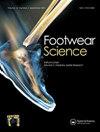Evaluation of running economy in runners wearing shoes that elicit natural forefoot strikes
IF 3.8
Q2 ERGONOMICS
引用次数: 0
Abstract
It is well recognized that many elite long-distance runners are forefoot (nonrearfoot, NRF) strikers; however, current scientific evidence does not support the metabolic benefits of NRF running, specifically the benefit of reduced oxygen consumption (VO2) (Anderson et al., 2020). Prior studies that evaluated the effects of foot strike patterns on running economy relied on assessments of VO2 between runners with NRF and rearfoot (RF) strikes or before and after a voluntary manipulation of foot strike patterns. These approaches may not be sufficiently sensitive to detect potential small differences in the running economy associated with foot strike pattern, if any. Recently available on the market are running shoes that elicit natural and involuntary NRF strikes (Figure 1, Wave Duel Pro, WDP). An evaluation of running economy that compares NRF and RF runners wearing these new shoes with those wearing traditional shoes would provide new insights for a better understanding of foot strike pattern and running economy.跑步者穿着能引发自然前掌冲击的鞋进行跑步经济性评估
众所周知,许多优秀的长跑运动员都是前足(非后足,NRF)前锋;然而,目前的科学证据并不支持NRF跑步的代谢益处,特别是减少氧气消耗(VO2)的益处(Anderson et al., 2020)。先前评估足部打击模式对跑步经济性的影响的研究依赖于对NRF和后足(RF)打击的跑步者之间的VO2评估,或者在自愿操纵足部打击模式之前和之后。如果有的话,这些方法可能不够灵敏,无法检测出与脚击模式相关的跑步经济性的潜在微小差异。最近在市场上可以买到的跑鞋会引起自然和非自愿的非射频撞击(图1,Wave Duel Pro, WDP)。通过比较NRF和RF跑步者穿着这些新鞋与穿着传统鞋的跑步者的跑步经济性评估,将为更好地理解脚击模式和跑步经济性提供新的见解。
本文章由计算机程序翻译,如有差异,请以英文原文为准。
求助全文
约1分钟内获得全文
求助全文

 求助内容:
求助内容: 应助结果提醒方式:
应助结果提醒方式:


